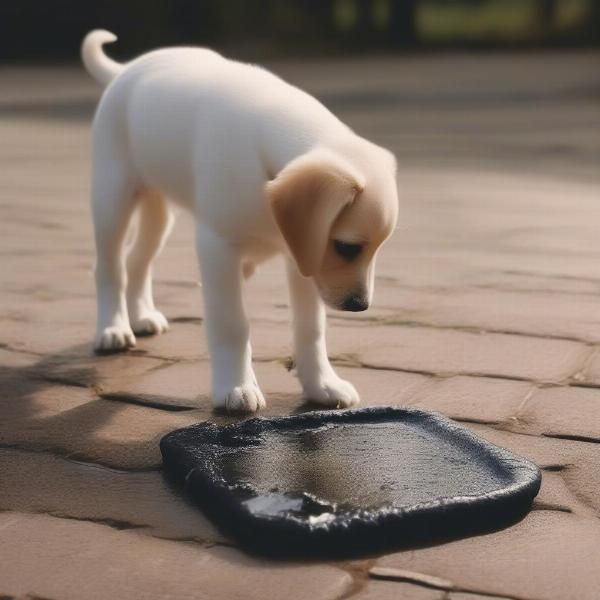Dogs drinking their own urine can be alarming for owners. While not always a cause for serious concern, it’s crucial to understand the potential reasons behind this behavior. This article will explore the various factors that may lead a dog to drink its own pee, ranging from simple curiosity to underlying medical conditions. We’ll also discuss when it’s time to seek veterinary attention and provide practical tips for addressing this issue.
Medical Reasons Behind Urine Drinking
Several medical conditions can cause increased thirst and changes in urine composition, potentially leading a dog to drink their own pee. Diabetes, kidney disease, and urinary tract infections can all alter the smell and taste of urine, making it more appealing to some dogs. Cushing’s disease, a hormonal disorder, can also lead to excessive thirst and urination, increasing the opportunity for a dog to encounter its own urine.
Behavioral Factors Contributing to Urine Drinking
Beyond medical reasons, several behavioral factors can explain why a dog drinks its own urine. Puppies, particularly, might explore their environment through taste and smell, including their own waste. Boredom, stress, or anxiety can also manifest in unusual behaviors like urine drinking. In some cases, dogs confined to small spaces or lacking proper cleaning routines may drink their urine due to the readily available access. Submissive or anxious dogs may also exhibit this behavior, particularly if they have been punished for house soiling accidents.
 Dog drinking urine due to behavioral factors
Dog drinking urine due to behavioral factors
When to Seek Veterinary Attention for Urine Drinking in Dogs
While occasional urine drinking might not be a cause for immediate alarm, persistent or sudden changes in this behavior warrant a visit to the veterinarian. If your dog suddenly starts drinking their urine or if the behavior is accompanied by other symptoms like increased thirst, frequent urination, changes in appetite, lethargy, or vomiting, it’s essential to seek professional advice. Your veterinarian can conduct necessary tests to rule out any underlying medical conditions and recommend appropriate treatment.
How to Stop a Dog from Drinking Their Own Urine
Addressing the underlying cause is crucial to effectively stopping this behavior. If a medical condition is diagnosed, treating the underlying issue will often resolve the urine drinking. For behavioral reasons, providing ample mental and physical stimulation through exercise, toys, and training can help alleviate boredom and stress. Ensuring a clean environment by promptly cleaning up accidents can limit opportunities for access to urine. Positive reinforcement training can help address submissive or anxious behaviors.
Conclusion
Understanding why your dog drinks their own pee is the first step towards addressing this behavior. While sometimes a harmless act of curiosity, it can also signal underlying medical or behavioral issues. By observing your dog’s behavior, consulting with your veterinarian, and implementing appropriate strategies, you can help curb this habit and ensure your dog’s overall well-being. Remember to address any underlying anxieties and provide a stimulating environment for your furry friend.
FAQ
- Is it dangerous for my dog to drink his own pee? While occasional instances might not be harmful, persistent urine drinking can indicate an underlying problem and should be addressed.
- What medical conditions can cause urine drinking in dogs? Conditions like diabetes, kidney disease, urinary tract infections, and Cushing’s disease can lead to changes in urine and increased thirst.
- How can I stop my dog from drinking his pee? Address the root cause, whether medical or behavioral, provide a stimulating environment, and promptly clean up accidents.
- Should I punish my dog for drinking his urine? Punishment is often ineffective and can worsen anxiety. Focus on positive reinforcement and addressing the underlying cause.
- When should I contact my veterinarian about this behavior? Consult your vet if the behavior is persistent, sudden, or accompanied by other symptoms like increased thirst or changes in appetite.
- Can diet affect a dog’s tendency to drink urine? A balanced diet is essential for overall health, but dietary changes alone might not resolve the issue.
- Is urine drinking more common in certain dog breeds? There’s no evidence suggesting a breed-specific predisposition to this behavior.
Related Articles on ILM Dog
About ILM Dog: ILM Dog is your trusted resource for expert advice on all aspects of dog care, from breed selection and puppy care to senior dog health and training. We offer practical tips, product recommendations, and insights into dog behavior, nutrition, and grooming. Contact us today for personalized advice and resources to help you provide the best possible care for your canine companion. Email: [email protected], Phone: +44 20-3965-8624.